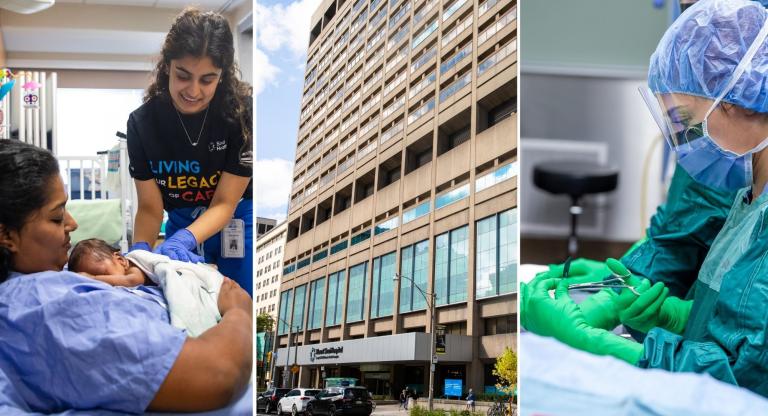A ‘cloak of comfort’: an integrated approach to palliative care for cancer patients

At Mount Sinai Hospital, palliative care is fully integrated into cancer care, providing comprehensive, person-centered support for those with advanced illness.
Palliative care, derived from the Latin pallium meaning “cloak,” offers comfort and support to individuals with serious illnesses. Often misunderstood as solely end-of-life care, it actually provides relief at any stage of a life-threatening illness and can be provided in tandem with cancer treatment.
This holistic approach addresses physical, emotional, and spiritual needs, aiming to improve quality of life for both patients and their families. In fact, early integration of palliative care can enhance symptom management, extend life and offer greater support to caregivers.
Patients can receive care at Mount Sinai Hospital’s Cancer Care Clinic, at home through the Temmy Latner Centre’s home palliative care program, and in the palliative care unit at Hennick Bridgepoint Hospital.
Bridging the knowledge gap
Dr. Harleen Toor, palliative care physician and Lead for Outpatient Palliative Care, breaks down some common misconceptions and shares what makes Sinai Health a leader in palliative care, within cancer care.
Many Canadians are unaware of what palliative care means. Could you speak to this, and share what you would like people to know about this area of care?
To “palliate” means to support patients in many ways — managing symptoms from serious illnesses and cancer treatments, providing emotional and spiritual care, and helping with social and financial needs through social workers and community programs.
Research shows that seeing a palliative care provider early, even at diagnosis, can help people live longer and feel better, with improved symptom control and more support for caregivers. A referral to our palliative care team does not mean stopping care, it adds extra support to improve quality of life and help plan for the future with dignity and choice, no matter the stage of illness.
Could you share how palliative care physicians work alongside the Cancer Care Clinic to support patients after receiving their diagnosis?
At Sinai Health, our outpatient palliative care team works closely with other specialist physicians at the clinic to provide coordinated care. We support patients from the time they are diagnosed with advanced cancer, through their illness journey and help them transition to comfort-focused care at the end of life.
When cancer treatments are no longer an option, we help patients and families plan care that fits their wishes, whether at home, in hospice, or in a palliative care unit.
Our clinic is part of Sinai Health’s larger palliative care team – the Temmy Latner Centre for Palliative Care - which supports patients in the hospital, at home, and at Hennick Bridgepoint Hospital.
We are also proud to be part of Canada’s largest multidisciplinary sarcoma program, caring for young patients from across the country. We also collaborate with medical oncology on research showing how earlier palliative care improves quality of life, eases symptoms, and supports caregivers.
Why early access to palliative care matters
Susan Blacker, Senior Director, Community Partnerships, Cancer and Palliative Programs Performance at Sinai Health, shares why timely access to palliative care is a cornerstone of compassionate cancer care treatment: “Ensuring that patients have rapid access to our expert palliative care providers at any point of the experience of living with cancer has been an important goal for our program,” she says.
“Our team has demonstrated excellence in providing the benefits that patients and their caregivers can experience with earlier involvement.”












